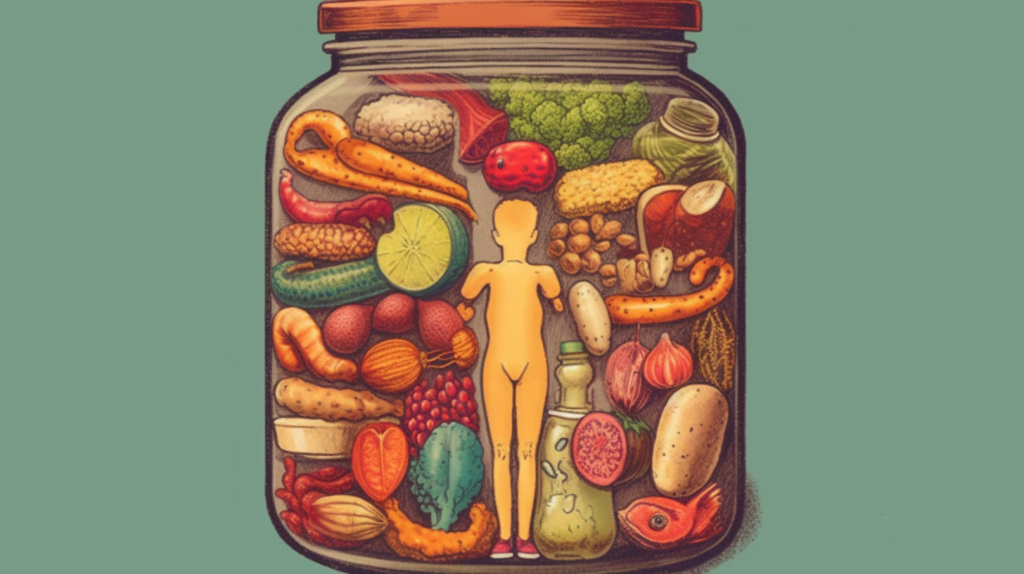We all know that the health of our body and mind are tied together in complex ways, but have you ever considered how important gut health is to mental and emotional wellbeing? Recent research has uncovered a fascinating link between the health of our digestive system, or gut, and its connection to the brain. This article delves deeper into “The Gut-Brain Connection: Caring for Digestive Health.”
1) The Gut-Brain Link: What You Need to Know
The gut and brain are more interconnected than many of us think. The gut-brain connection works both ways and is very significant in many aspects of our lives. Understanding how they interact helps us take better care of our bodies and mental health.
The first thing that comes to mind when we think of the gut-brain connection is digestion. The gut is responsible for digesting what we eat, and the brain helps to regulate digestion through signals sent to the gut and the actions of the enteric nervous system (ENS). The ENS can also respond to emotional state, meaning our emotions can affect how we digest food.
The gut and brain also influence each other through the microbiota-gut-brain axis, which includes the immune system, the endocrine system, and the nervous system. This axis plays an important role in our mental health, as the composition of our gut microbiome has a direct impact on our emotions. The key to keeping this axis in balance is maintaining a healthy and balanced diet.
- The gut and brain are connected through digestion, the enteric nervous system, and the microbiota-gut-brain axis
- Our emotions have a direct impact on how we digest food
- A healthy and balanced diet is essential for maintaining a balanced gut-brain axis

2) Reasons Why Gut Health is Important
Having a healthy gut is essential for maintaining overall wellbeing. Below are reasons why gut health is so important:
- Absorb vitamins and minerals: Healthy gut allows the body to take in nutrients to help us stay nourished, energetic, and vital.
- Eliminate toxic waste: Taking away toxins from the body is critical. Without this process, we are at risk for becoming ill by all the toxins that continue to pile up.
- Produce essential vitamins: A healthy gut supports and encourages the building blocks and processes to create vitamins like B vitamins, K, and folate.
- Keep immunity healthy: A gut in optimal condition helps regulate our overall immunity—our defense system against germs and infectious organisms.
The microbiome that live in our gut is also essential. They protect us against predators, break down the food, and help us absorb essential vitamins. When these friendly bacteria run low in the gut flora, we can be susceptible to illnesses.
A healthy gut contributes to more than just physical wellbeing—it can also influence our mental health and emotions. When everything else is healthy, our stress levels can naturally fall, our endorphins can rise, and our overall mental state can be much calmer.
3) Optimizing Your Digestive System
A well-functioning digestive system is essential for maximum absorption of nutrients in the body. It aids in keeping our energy levels high, detoxification and keeps our immune system healthy. Here are some tips for optimizing your digestive system.
- Eat slowly and mindfully: Eating too quickly or on the go can upset your digestive process and can leave you feeling bloated and uncomfortable. Give yourself time to chew your food and truly enjoy your meals. Being present while eating will help relax your body and mind; aiding digestion.
- Add fermented foods: Adding fermented foods to your diet helps to introduce good bacteria to your digestive system, which helps aid digestion. Some of the most popular are sauerkraut, kimchi, kombucha and tempeh.
- Drink warm liquids: Drinking warm liquids before a meal or during helps to stimulate digestion. Some examples are warm water, tea or bone broth.
These are just a few methods to get your digestive system functioning optimally. Eating better, being mindful and introducing some probiotics into your diet can all have positive impacts on your digestion. Incorporate them into your routine and watch your digestion improve!

4) Unlocking the Unseen Benefits of a Healthy Gut
Healthy, well-functioning intestines are essential for overall health. While many are familiar with the basics—like improving digestion, boosting immunity, and optimizing nutrition—there are lesser known benefits that come along with prioritizing gut health. Here’s why everyone should be taking action to protect their gut health.
- Mood Enhancement – Intestinal bacteria produces serotonin, a neurotransmitter associated with elevated mood and decreased stress. People with a happy gut are likely to feel more relaxed and better overall.
- Defense Against Disease – An optimized level of intestinal flora has been linked to lowered risk of chronic diseases, including heart disease and certain types of cancers.
- Good Skin – Healthy intestinal bacteria can help clear up inflammation and improve skin issues, such as psoriasis and acne.
Though diet and lifestyle play a role in keeping the gut microbiome healthy, taking the time to understand the full amount of potential health benefits is an essential part of leading a full and happy life. To be healthy and fulfilled, it’s critical to pay attention to the wellbeing of your entire body, including the unseen elements of the gut.
5) The Role of Diet, Exercise and Supplements in Supporting Digestive Health
Good digestive health is essential to overall health. Diet, exercise, and supplements can play an important role in helping your digestive system function optimally and prevent digestive health problems.
Diet: A balanced diet that is rich in dietary fiber found in fruits, vegetables, legumes, and whole grains and contains probiotics from fermented foods such as yogurt and sauerkraut can help support digestive health. Avoiding processed foods and refined sugars, which can cause inflammation in the body, is important. Eating foods that are easy to digest like bananas, papaya, oatmeal, and boiled potatoes can also help.
Exercise: Regular physical activity helps keep things moving through your digestive system and can help prevent constipation. Natural forms of exercise such as walking, swimming, and cycling are best and will help decrease stress which can be a factor in digestive issues. Also, stress reduction techniques like yoga and meditation can help reduce stress levels.
Supplements: Supplements such as probiotics, digestive enzymes, fiber, and herbal remedies like aloe vera and ginger can help support good digestive health. There are many available brands, so it’s important to research and choose quality products. It’s also important to follow the recommended dosage instructions when taking supplements.

6) Connecting Your Emotions and Mind to Better Gut Health
Bringing Balance to the Gut
Your emotional and mental state can heavily affect your gut health. Working on controlling your mental health and negative emotions can help to bring balance back to your gut health. It’s important to look at the mind-gut connection as a two-way street, where both physical and mental impacts occur.
Gaining control over your mental health and emotions can have a positive effect on your gut health. In order to support your gut health, try:
- Mindful breathing
- Meditation
- Relaxation techniques
- Seeking support from a therapist, coach, or support group
You can also help your gut by monitoring your stress levels and taking steps to manage and decrease the amount of stress in your life. Manageable ways of reducing stress include activities like walking, yoga, journaling, and speaking with a friend.
Watch for signs of anxiety and depression, but also look out for physical symptoms like nausea, stomach discomforts, and altered bowel movements. Once you’re aware of these symptoms, pay attention to what they are telling you and work to correct any mood or lifestyle problems that might be driving them in order to get your gut health back on track.
7) Taking Control of Your Gut-Brain Connection
Are you struggling to manage your moods and energy levels? This could be because your gut and brain are not working together as they should be, like two cogs in the wheel. Your gut-brain connection is key to understanding what your body needs for optimal health.
The gut is responsible for breaking down the nutrients that enter your body, while the brain controls how your body reacts to those nutrients. This connection plays a role in everything from mood regulation to sleep to overall inflammation and wellbeing. By taking control of this connection, you can manage your moods and energy levels more effectively.
Here’s how:
- Focus on your diet. Eat foods rich in probiotics and prebiotics, which help your gut flourish with healthy bacteria. This helps to build a strong gut-brain connection, as your gut bacteria communicates with your brain by releasing chemicals.
- Reduce stress. Chronic stress can throw off your gut-brain balance, so practice mindfulness and meditation to center yourself. Doing this regularly can help to keep your gut healthy and improve your mood.
- Connect with nature. Not only can nature bring you a sense of peace and relaxation, but it can also help support the bacterial diversity of your gut microbiome. Get outside and go for a walk whenever you need to clear your mind and improve your mood.

8) Building an Integrative Mind-Body Approach to Digestive Health
A healthy gut plays an integral role in maintaining the overall balance of your well-being. However, this is often overlooked, as many people tend to prioritize physical health and exercise above all else. The truth is, if digestive health is not taken care of, it can lead to a whole host of physical and mental health issues.
For this reason, an integrative approach to digestive health is essential. This type of approach requires looking at the entire picture of one’s health and not just focusing on one particular symptom. It also involves healing the body from within. Here are a few points to keep in mind when taking such an approach:
- Focus on finding the root cause of the problem
- Strive to reach a balance between mind and body
- Eat nutrient-dense foods that are easy to digest
- Manage your stress levels effectively
When looking to restore balance to your gut, it’s important to remember that the causes could be rooted in any number of lifestyle issues. As such, it’s crucial to understand the underlying mechanisms that are affecting your digestive system. Assess your lifestyle habits that could be contributing to digestive issues, and make the necessary changes to promote a healthier gastrointestinal tract.
Taking a comprehensive approach to health means recognizing the importance of the gut-brain connection and taking concrete steps to care for digestive health. By understanding the pathways between the gut and the brain, we can boost overall wellbeing and life satisfaction.
